八下U2 Integrated skills 教案
八年级下册英语教学设计:Unit 2 Integrated skills

The third one is Mount Huang. We can see the views of Mount Huang are really beautiful and it’s a place of natural beauty. But it’s dangerous to climb it in winter. So you can go there in any season except winter.
2.Listen to the best time to go to these places.
What is the best time to go to these places? Let’s listen again and put a tick in the correct boxes.
4.garden
The last place Iwant to tell you is Suzhou. Do you know what is Suzhou famous for? Yes, and the gardens there are traditional Chinese ones.But the best time to go there are spring and autumn.
Important and difficult teaching points
Listen and completetheinformation about the places and time.
Teaching procedures
Step One: Lead-in
Just like a saying goes“Like travelling, love life”, I’m also a travelling-lover.I’ve been to many places of interest in China. Do you want to know some of them?
【译林版八年级英语下册教案】Unit2Integratedskills
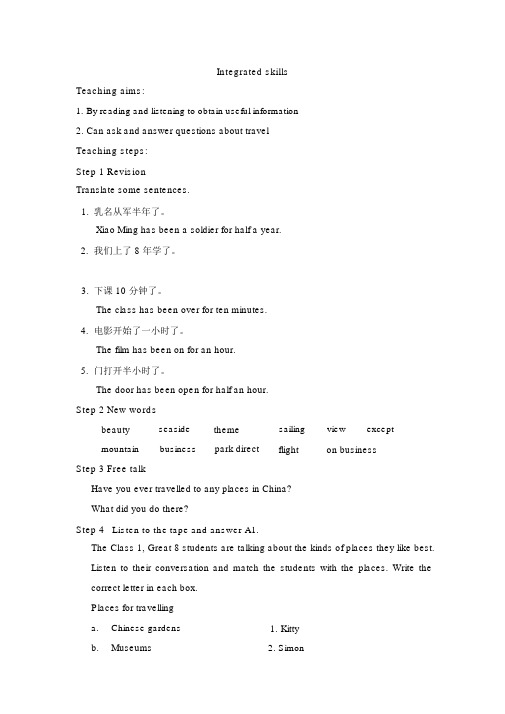
Integrated skills Teaching aims:1.By reading and listening to obtain useful information2.Can ask and answer questions about travel Teaching steps:Step 1 RevisionTranslate some sentences.1.乳名从军半年了。
Xiao Ming has been a soldier for half a year.2.我们上了 8 年学了。
3.下课 10 分钟了。
The class has been over for ten minutes.4.电影开始了一小时了。
The film has been on for an hour.5.门打开半小时了。
The door has been open for half an hour.Step 2 New wordsbeauty mountain seasidebusinessthemepark directsailingflightview excepton businessStep 3 Free talkHave you ever travelled to any places in China?What did you do there?Step 4Listen to the tape and answer A1.The Class 1, Great 8 students are talking about the kinds of places they like best.Listen to their conversation and match the students with the places. Write the correct letter in each box.Places for travellinga. Chinese gardensb. Museums 1. Kitty2. Simonc. Places of natural beauty 3. Sandyd.Seaside cities 4. Daniele.Theme parks 5. MillieStep 5 Make sentences use the information in A1.Kitty likes to go⋯.Mil lie wants to go⋯Step 6 Ask students talk with classmatesWhat is important when you plan your holiday?Step 7 Listen to the tape finish A2.The students are listening to a radio programme about the best time to visitsome places in China. Put a tick (√) in the correct boxes.Places to go Spring SummerAutumn Winter Chinese Suzhou,gardens YangzhouMuseums Beijing,Xi ’ anPlaces of Mount Huang,natural beauty JiuzhaigouSeaside cities Dalian,QingdaoTheme parks Shenzhen,Hong KongStep 8 Finish part A3 together.Amy wants to give her classmates some advice on travelling in China. Helpher complete her notes. Use the information in Parts A1 and A2 to help you.Places to go in ChinaKitty likes ___________, such as the Window of the world in Shenzhen or____________ Disneyland. She can go there all year round.Simon loves water sports, such as sailing. He thinks it is great fun. He can visit aseaside city like ______ or Qingdao this ________.Sandy likes places of ______________, like Mount Huang or Jiuzhaigou. She cango there in any season except _______. The views there in winter may bewonderful, but it is dangerous to climb the mountains or hills on cold andsnowy days.Daniel likes ________________. He can visit Suzhou or Yangzhou. The best timeto go there is in spring or________. There may be some rain, but the weather isusually nice at that time of year.’ an. She can visit museums in Millie likes _________. She can go to Beijing or Xiany season.Step 9 Pair workWork in pairs. Talk about your travelling.A: Where did you go last summer?B: I went to⋯A:What did you do there?B:I went ⋯ I had a fantastic time.Step 10 Written taskYour foreign friend wants to visit Suzhou, please give him some advice.。
Integratedskills教案

Period 5Teaching content: Integrated skillsTeaching objectives:To recognize key expressions used to describe typical holiday activities.To complete information tables by listening for key information.To complete written statements by identifying information from reading and listening.Important & difficult points:1. Words: except, mountain, business, direct2. Phrases: Chinese gardens, places of natural beauty, seaside cities, all year round, on cold and snowydays, at that time of year, the May Day holiday, on business, take a direct flight3. Useful expressions: Do you have any plans for the May Day holiday?By the way, how long does it take to fly to Chengdu?Teaching procedure:Activity One Lead inStep 1 Free talk1. Where would you like to go on holiday?2. Why would you like to go there?Step 2 Present: Chinese gardensmuseumsplaces of natural beautyseaside citiestheme parksActivity Two Travelling in ChinaStep 1 Finish A11. Listen and finish A1.2. Check the answers: A: What kind of places does … like best?B: … likes … best.Step 2Finish A2.1. Present:T: What cities do you think of when we talk about Chinese gardens / museums / places of natural beauty / seaside cities / theme parks ?S:…→Suzhou, Yangzhou; ...2. Have a guess: 1. What’s the best season to visit …?2. Why is it the best season to visit there?3. Listen and finish A2.4. Check the answers: … is/ are the best time to …Step 3Finish A3.1. Complete the passage.2. Check the answers:Step 4 Work in groupsMay Day holiday is coming. 1. Would you like to go on a group trip?2. Which place would you like to visit? Why?Activity Three I’m going to visit Chengdu.Step 1Listen and answer1. Where will Amy go?2. How will they go there?→take a direct flight to…3. How long will they stay there?Step 2Read in pairsStep 3Work in pairs: Make a new dialogueActivity Four Exercises一、根据句意或括号中的中文提示、首字母写出句中所缺单词,使句子通顺。
《八年级英语牛津版8AUnit2IntegratedSkills教案:学生主导教学,提高自主学习能力
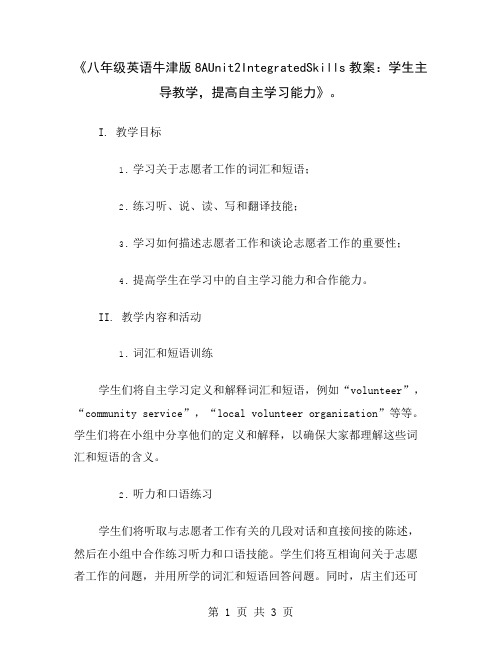
《八年级英语牛津版8AUnit2IntegratedSkills教案:学生主导教学,提高自主学习能力》。
I. 教学目标1.学习关于志愿者工作的词汇和短语;2.练习听、说、读、写和翻译技能;3.学习如何描述志愿者工作和谈论志愿者工作的重要性;4.提高学生在学习中的自主学习能力和合作能力。
II. 教学内容和活动1.词汇和短语训练学生们将自主学习定义和解释词汇和短语,例如“volunteer”,“community service”,“local volunteer organization”等等。
学生们将在小组中分享他们的定义和解释,以确保大家都理解这些词汇和短语的含义。
2.听力和口语练习学生们将听取与志愿者工作有关的几段对话和直接间接的陈述,然后在小组中合作练习听力和口语技能。
学生们将互相询问关于志愿者工作的问题,并用所学的词汇和短语回答问题。
同时,店主们还可以为学生们提供一些互动游戏和任务,例如“匹配词汇和短语”,以检查学生们的理解和记忆力。
3.阅读和写作练习学生们将自主阅读有关志愿者工作的文章,并在小组内分享他们的想法和体验。
接下来,学生们将撰写一篇短文,介绍他们自己或其他人的志愿者经历。
在小组中,学生们将合作改正对方的稿子,并提供建议和反馈。
4.翻译练习学生们还将自主完成一些翻译任务,例如翻译关于志愿者工作的句子和表达。
学生们将在小组中分享他们的翻译成果,并互相修正和完善。
5.分组讨论和反馈在教学结束前,学生们将分组进行讨论,谈论他们学习的体验和收获,并提供彼此反馈。
同样,老师将给予学生们一些正面的鼓励和肯定,以激励学生们不断提高自己的学习能力和表现。
III. 教学评估教学评估将会从多个角度出发。
老师将根据学生们的听力、口语、阅读、写作和翻译能力来进行评估,评估标准包括发音、语法、用词等。
学生之间也可以相互进行评估和反馈,以提高彼此的学习能力和表现。
最重要的是,学生的学习成果将会被定期测试和比较,以确保他们的学习是有进展的。
八年级英语下册 Unit 2 Travelling Integrated skills教案
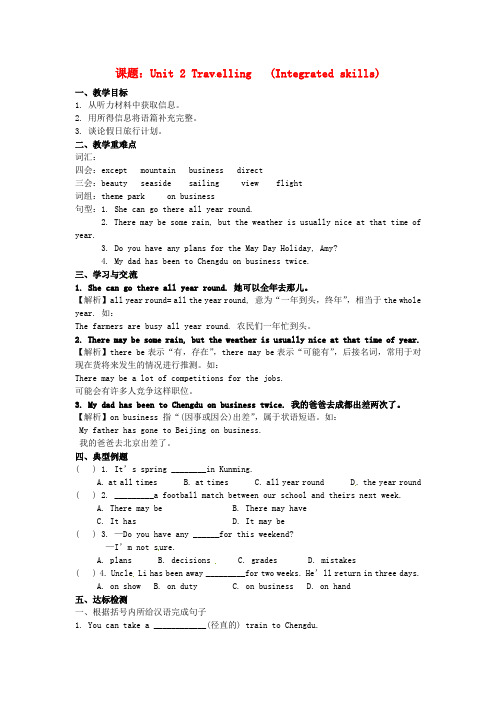
课题:Unit 2 Travelling (Integrated skills)一、教学目标1. 从听力材料中获取信息。
2. 用所得信息将语篇补充完整。
3. 谈论假日旅行计划。
二、教学重难点词汇:四会:except mountain business direct三会:beauty seaside sailing view flight词组:theme park on business句型:1. She can go there all year round.2. There may be some rain, but the weather is usually nice at that time of year.3. Do you have any plans for the May Day Holiday, Amy?4. My dad has been to Chengdu on business twice.三、学习与交流1. She can go there all year round. 她可以全年去那儿。
【解析】all year round= all the year round, 意为“一年到头,终年”,相当于the whole year. 如:The farmers are busy all year round. 农民们一年忙到头。
2. There may be some rain, but the weather is usually nice at that time of year. 【解析】there be表示“有,存在”,there may be表示“可能有”,后接名词,常用于对现在货将来发生的情况进行推测。
如:There may be a lot of competitions for the jobs.可能会有许多人竞争这样职位。
3. My dad has been to Chengdu on business twice. 我的爸爸去成都出差两次了。
初中英语牛津译林版八年级下册Unit2《Integrated skills》优质课公开课教案教师资格证面试试讲教案
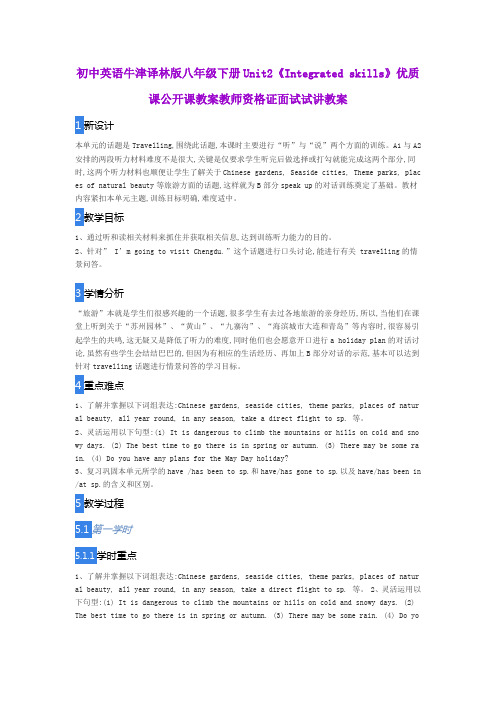
初中英语牛津译林版八年级下册Unit2《Integrated skills》优质课公开课教案教师资格证面试试讲教案1新设计本单元的话题是Travelling,围绕此话题,本课时主要进行“听”与“说”两个方面的训练。
A1与A2安排的两段听力材料难度不是很大,关键是仅要求学生听完后做选择或打勾就能完成这两个部分,同时,这两个听力材料也顺便让学生了解关于Chinese gardens, Seaside cities, Theme parks, plac es of natural beauty等旅游方面的话题,这样就为B部分speak up的对话训练奠定了基础。
教材内容紧扣本单元主题,训练目标明确,难度适中。
2教学目标1、通过听和读相关材料来抓住并获取相关信息,达到训练听力能力的目的。
2、针对” I’m going to visit Chengdu.”这个话题进行口头讨论,能进行有关 travelling的情景问答。
3学情分析“旅游”本就是学生们很感兴趣的一个话题,很多学生有去过各地旅游的亲身经历,所以,当他们在课堂上听到关于“苏州园林”、“黄山”、“九寨沟”、“海滨城市大连和青岛”等内容时,很容易引起学生的共鸣,这无疑又是降低了听力的难度,同时他们也会愿意开口进行a holiday plan的对话讨论,虽然有些学生会结结巴巴的,但因为有相应的生活经历、再加上B部分对话的示范,基本可以达到针对travelling话题进行情景问答的学习目标。
4重点难点1、了解并掌握以下词组表达:Chinese gardens, seaside cities, theme parks, places of natur al beauty, all year round, in any season, take a direct flight to sp. 等。
2、灵活运用以下句型:(1) It is dangerous to climb the mountains or hills on cold and sno wy days. (2) The best time to go there is in spring or autumn. (3) There may be some ra in. (4) Do you have any plans for the May Day holiday?3、复习巩固本单元所学的have /has been to sp.和have/has gone to sp.以及have/has been in /at sp.的含义和区别。
unit2 Integrated Skills 课时教案牛津译林版八年级英语下册

西蒙和艾米之间有一段对话。现在听听并尝试回答以下问题:
1. Where does Amy plan to go during May Day holiday?
2. Where’s Amy’s Dad?
3. How many times has Simon’s dad been to Singapore?
牛津译林版八年级英语下册
8BUnit2 Travelling
General topic
8BUnit 2 Travelling
总课时
第7课时
Subject
Integrated Skills
课型
新授
teaching objectives
Knowledge goal
识别用于描述典型假期活动的关键表达
从上下文和关键字推断一般含义
学生们正在计划前往中国不同地区的旅行。他们想知道该国的哪些地区符合他们的利益。阅读他们在说什么,并在表格中的正确方框中打勾。
Step4Listening to the tape
学生们正在收听有关在中国旅行的广播节目。仔细听录音,试图回答:中国哪个季节最适合他们做不同的事情?然后在第34页A2部分的正确方框中打勾。
Ability target
通过阅读和听力理解特定信息
通过监听关键信息来完成信息表
Emotion goal
通过识别阅读和听力信息来完成书面陈述
Teaching focus
通过阅读和听力理解特定信息
通过监听关键信息来完成信息表
And difficulty
小黑板.pictures .a记录器
education resources
2020-2021学年牛津译林版英语八年级下册Unit2Integratedskills教案

(1)语法:一般将来时态和现在进行时态的区分与运用。
-难点举例:学生在实际对话中容易混淆两种时态,需要教师通过具体情境和例句进行解释和指导。
(2)词汇:旅行相关词汇的拼写和用法。
-难点举例:部分词汇拼写相似,如destination和departure,学生容易混淆。教师需通过对比、联想等方法帮助学生记忆。
3. section C:写作练习,制定个人旅行计划。
-写作指导:如何撰写旅行计划,包括目的地、行程安排等。
-练习:学生根据所学内容,制定自己的旅行计划。
二、核心素养目标
本节课的核心素养目标为:
1.语言能力:培养学生运用英语进行旅行话题的听说读写综合运用能力,掌握一般将来时态和现在进行时态,提升语言表达能力。
2.在实践活动和小组讨论中,部分学生表现较为被动,可能是因为他们对旅行计划的相关知识还不够熟悉。为了提高这部分学生的参与度,我可以在课堂上多设置一些简单易懂的任务,让他们在完成过程中逐渐增强自信。
3.在教学过程中,我注意到部分学生对于阅读材料中的旅游景点和特色了解不足。为了拓展他们的国际视野,我可以在课后布置一些关于世界各地旅游景点的阅读材料,让学生们了解更多相关信息。
1.讨论主题:学生将围绕“旅行计划在实际生活中的应用”这一主题展开讨论。他们将被鼓励提出自己的观点和想法,并与其他小组成员进行交流。
2.引导与启发:在讨论过程中,我将作为一个引导者,帮助学生发现问题、分析问题并解决问题。我会提出一些开放性的问题来启发他们的思考。
3.成果分享:每个小组将选择一名代表来分享他们的讨论成果。这些成果将被记录在黑板上或投影仪上,以便全班都能看到。
-学生需要掌握并正确运用词汇,如destination(目的地)、schedule(行程)、flight(航班)等。
牛津译林版英语八年级下册Unit2Integratedskills教学设计
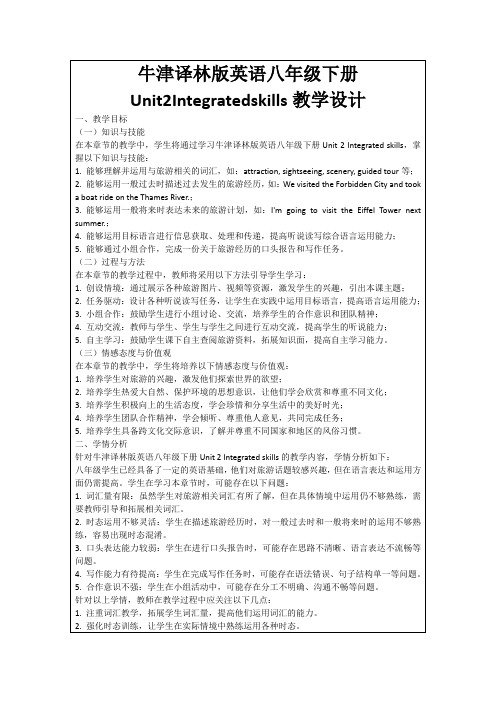
1.词汇量有限:虽然学生对旅游相关词汇有所了解,但在具体情境中运用仍不够熟练,需要教师引导和拓展相关词汇。
2.时态运用不够灵活:学生在描述旅游经历时,对一般过去时和一般将来时的运用不够熟练,容易出现时态混淆。
-对学习困难的学生给予个别辅导,帮助他们克服学习难点。
3.任务型教学,提高综合语言运用能力
-设计各种听说读写任务,让学生在实践中运用目标语言,提高综合语言运用能力。
-小组合作完成任务,培养学生的合作意识和团队精神。
4.强化语言训练,突破重难点
-针对一般过去时和一般将来时的运用,设计专项练习,帮助学生熟练掌握时态变化。
2.强化时态训练,让学生在实际情境中熟练运用各种时态。
3.加强口头表达能力的培养,引导学生进行有针对性的练习。
4.系统性指导写作,提高学生的写作能力,培养他们的写作兴趣。
5.培养学生合作意识,提高小组活动效果,促进学生共同成长。
三、教学重难点和教学设想
(一)教学重难点
1.重点:掌握旅游相关的词汇和表达方式,如:sightseeing, attraction, guided tour等;运用一般过去时和一般将来时描述旅游经历和计划。
4.完成课后练习册中的相关习题,巩固旅游话题的词汇和语法知识。
作业要求:
1.作业需在课后按时完成,保持书写规范,注意单词拼写和语法正确。
2.家长监督并签字,确保作业质量,培养学生的自主学习能力。
3.教师批改作业后,针对学生的完成情况进行反馈,鼓励学生改进和进步。
2.通过例句和情境,讲解一般过去时和一般将来时在描述旅游经历和计划中的应用。
初中英语八年级下册(牛津译林版)Unit2lntegratedskills教学设计
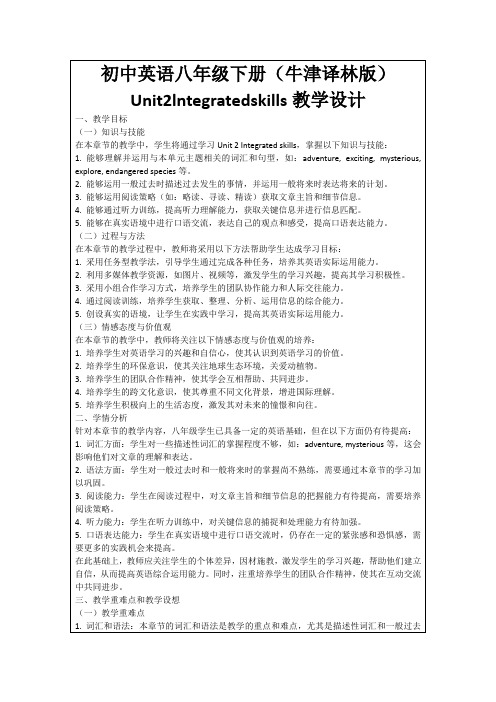
一、教学目标
(一)知识与技能
在本章节的教学中,学生将通过学习Unit 2 Integrated skills,掌握以下知识与技能:
1.能够理解并运用与本单元主题相关的词汇和句型,如:adventure, exciting, mysterious, explore, endangered species等。
2.能够运用一般过去时描述过去发生的事情,并运用一般将来时表达将来的计划。
3.能够运用阅读策略(如:略读、寻读、精读)获取文章主旨和细节信息。
4.能够通过听力训练,提高听力理解能力,获取关键信息并进行信息匹配。
5.能够在真实语境中进行口语交流,表达自己的观点和感受,提高口语表达能力。
(二)过程与方法
2.阅读和听力练习:
-阅读一篇关于探险的英文文章,回答文章后的问题,提高阅读理解能力。
-观看一部关于濒危动物的纪录片,记录关键信息,并用自己的话总结纪录片的主要内容。
3.口语和写作练习:
-与同学合作,编写一个关于保护濒危动物的对话,并进行角色扮演,提高口语表达能力。
-以“保护濒危动物,从我做起”为主题,撰写一篇英语短文,阐述自己的观点和建议,不少于80词。
4.课后拓展活动:
-加入学校组织的环保社团,参与濒危动物保护的志愿活动,将所学知识运用到实际中。
-与家人或朋友分享本章节所学内容,讨论如何为保护濒危动物做出贡献。
5.自主学习任务:
-制定一个英语学习计划,包括每天的学习内容、学习目标和预期成果,提高自主学习能力。
-利用网络资源,学习更多关于生态保护和濒危动物的知识,拓宽视野。
-各小组汇报讨论成果,全班进行交流。
新版-牛津译林版八年级英语下册Unit2 Integrated skills教案(1)

Unit2 Integrated skills教案课题Integrated skills教学目标1. According to listen to the tape to get information.2. To develop students’ ability to infer meaning from context and key words.3. To learn to talk about the information about the places of interest in different places.重点To listen and develop the ability to extract information in order to complete the exercises.难点To listen and develop the ability to extract information in order to complete the exercises.教学过程设计具体环节教师行为学生行为A. Travellingin China.Step 1 Presentation 1. Free talk.T: Where would you like to go on holiday? And why wouldyou want to go there?2. Answer questions.3. Learn and remember.Write down:Chinese gardens, places of natural beauty, seaside cities,theme parks on the blackboard.T: Different people like different places.Which do you like, Chinese gardens, museums, places ofnatural beauty, seaside cities or theme parks?Free talk.Look at pictures.Answer question.Learn andremember.Listen carefully.Pay attention.Step 2 Listening 1.Listen to the tape and complete A1.T: What kinds of places do the students like best? Let’slisten and find out.2. Listen again and answer questions.3. Check answers.Listen and doexercise.Listen again.Answer questions.Check answers.Step 3 Listening 1. Ask and answer.T: What cities do you think of when we talk aboutAnswer questions.Chinese gardens / museums / the sea / theme parks?What places do you think of when we talk about places of natural beauty?2. Show pictures.T: What’s the best season to visit Chinese gardens / museums / places of natural beauty / seaside cities / theme parks?Why is it the best season to visit there?3. Listen to the tape and complete A2.T: Now let’s liste n to a radio programme and check your predictions.4.Check answers. Learn and think.Look at pictures. Practice in pairs.Pay attention. Listen to the tape. Complete A2.Check answers.Step 4 Practice 1. Complete A3.T: Let’s complete Amy’s notes in Part A3.2. Read A3 together.T: Now let’s read Part A3 together.Complete A3.Read together.Step 5 Activity 1. Work in pairs to discuss.Sample conversationS1: Where did you go last summer?S2: I went to the beautiful seaside city Xiamen.S1: What did you do there?S2: I went sailing and swimming.I had a fantastic time.2.Work in pairs and practice the dialogue.Work in pairs todiscuss.Pay attention.Practice in pairs.Practice thedialogue.Sample conversationS1: It’s my first time in China. I like to enjoy nature.Do you have any advice?S2: I think you can go to Mount Huang.You can go there in all seasons except winter becauseclimbing the mountain is dangerous in winter.I’m sure you’ll love the natural beauty there.Listen carefully.Speak up.B. Speak up I’m going to visit Chengdu.Step 1 Presentation 1. Listen to the tape and complete A3.T: Amy will go travelling during the May Day holiday.Where will she go?Ss: Chengdu.2. Listen to the tape and read after the tape.(1) Who will Amy go to Chengdu with?Her mum.(2) Why has Simon’s dad been to Chengdu twice?On business.(3) How will Amy go to Chengdu?She will take a direction flight to Chengdu.(4) How long does it take to fly to Chengdu?About three hours.3. Work in pairs to practice the dialogue.Listen and doexercise.Listen again.Read after thetape.Listen and think.Check answers.Practice in pairs.Step 2 Activity 1. Answer questions.T: This is Amy’s holiday plan. What’s your holiday plan?Where do you want to go during the May Day holiday?2. Work in pairs to practice.Answer questions.Practice in pairs.3. Make a new dialogue.(1) Where are you going?(2) Why do you plan to go there?(3) Who are you going with?(4) How will you get there?Sample conversationS1: Do you have any plans for the May Day holiday?S2: Yes. I’m going to visit Hangzhou.S1: Hangzhou is a beautiful city.Are you going there alone?S2: No. I’ll go with my parents. My dad used to work there and he wants to visit some of his friends.S1: That’s great! How will you get there?S2: Well, we’ll take the train. It only takes one and a half hours to go there by train.S1: That’s very fast. How ma ny days are you staying?S2: Three days.S1: Have a nice trip.S2: Thanks. Make a new dialogue.Listen carefully.Practice the dialogue.Speaking and thinking.作业1.Remember the words, phrases and sentences.2.Recite Part B.plete the exercise.4.Preview Study skills.板书设计Unit 2 TravellingIntegrated skills1. Words:except mountain business direct 2. Phrases:Chinese gardens places of natural beautyseaside cities all year roundon cold and snowy days at that time of yearthe May Day holiday on businesstake a direct flight3. Sentences:Do you have any plans for the May Day holiday?By the way, how long does it take to fly to Chengdu? 教学反思。
八年级英语下册Unit2TravellingIntegratedskills教案
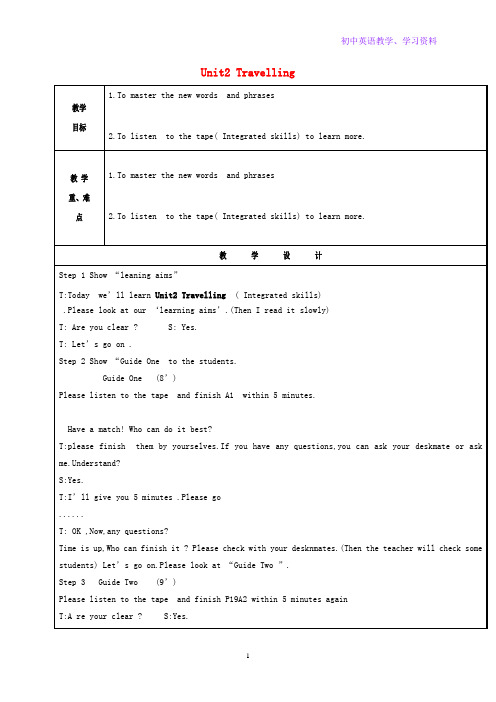
教 学 ims”
T:Today we’ll learnUnit2 Travelling( Integrated skills)
.Please look at our ‘learning aims’.(Then I read it slowly)
4.I must wash my own clothes since I have __ (grow) up.
5.Do you enjoy ______ (watch) English films?
后进生板演。后教阶段,后进生---中等生---优生更正,讲解。学生不会的老师讲。
板书设计
Unit2 TravellingIntegrated skills
Guide Four
Listen to the tape and act out Speak up within 9’minutes.
Have a match! Who can do it best?
T:Understand? S:Yes.
T:Let’s go .(Let one student act out it in front of the blackboard)
Unit2 Travelling
教学
目标
1.To master the new wordsand phrases
2.To listen to the tape(Integrated skills) to learn more.
教 学
重、难
点
1.To master the new wordsand phrases
牛津译林版八年级英语下册学案 Unit 2 Integrated skills 学案

译林版八年级英语下册Unit 2 Integrated skills学案学校:___________ 班级:___________ 姓名:___________ 家长签字:__________ 【板块要点】一、教学目标1.知识目标:掌握下列单词、词组和句型并能熟练朗读和使用。
2.能够听懂有关旅游地点和旅游季节的语篇。
3.能针对所听语篇提取、记录有关信息并完成旅行建议。
4.学会谈论自己的旅游计划。
教学重点:培养学生的听力技能,能运用本课所学知识谈论自己的旅游计划。
教学难点:如何提高学生的听力技能。
二、短语、词汇1. except but (除了)2. mou ntain hill (山)3. business(n) 生意busy(adj) 忙的4. direc t(adj直接的), director(n 导演),direction(n 方向),direct object(直接宾语),indirect object(间接宾语)5. Chinese gardens(中国式园林)6. places of natura l beauty(自然风景区)7. seaside cities(海边城市)8. all year roun d the whole year(一年到头)9. on cold and snowy days(在寒冷有雪的日子)10. at that time of year(在一年的那个时候)11. the May Day holiday(五一假期)12. on business(出差)13 tak e a direct flight(直飞)三、句型(语法)句型:Do you have any plans for the May Day holiday?By the way, how long does it take to fly to Chengdu?。
Unit2 Integrated skills教案牛津译林版八年级英语下册
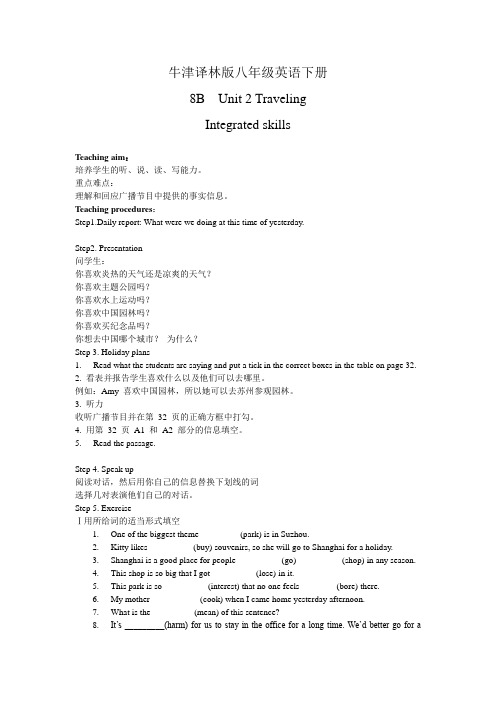
牛津译林版八年级英语下册8B Unit 2 TravelingIntegrated skillsTeaching aim:培养学生的听、说、读、写能力。
重点难点:理解和回应广播节目中提供的事实信息。
Teaching procedures:Step1.Daily report: What were we doing at this time of yesterday.Step2. Presentation问学生:你喜欢炎热的天气还是凉爽的天气?你喜欢主题公园吗?你喜欢水上运动吗?你喜欢中国园林吗?你喜欢买纪念品吗?你想去中国哪个城市?为什么?Step 3. Holiday plans1.Read what the students are saying and put a tick in the correct boxes in the table on page 32.2. 看表并报告学生喜欢什么以及他们可以去哪里。
例如:Amy 喜欢中国园林,所以她可以去苏州参观园林。
3. 听力收听广播节目并在第32 页的正确方框中打勾。
4. 用第32 页A1 和A2 部分的信息填空。
5.Read the passage.Step 4. Speak up阅读对话,然后用你自己的信息替换下划线的词选择几对表演他们自己的对话。
Step 5. ExerciseⅠ用所给词的适当形式填空1.One of the biggest theme _________(park) is in Suzhou.2.Kitty likes __________(buy) souvenirs, so she will go to Shanghai for a holiday.3.Shanghai is a good place for people __________(go) __________(shop) in any season.4.This shop is so big that I got __________(lose) in it.5.This park is so __________(interest) that no one feels ________(bore) there.6.My mother ___________(cook) when I came home yesterday afternoon.7.What is the _________ (mean) of this sentence?8.It’s _________(harm) for us to stay in the office for a long time. We’d better go for awalk.9.My father isn’t at home. He ___________(go) to Shanghai.10.He __________(go) to Shenzhen last summer. He got _________(lost) in the themepark.Ⅱ改错1.Read English everyday is very important to all of us students.2.The old woman was so poor to buy herself a pair of shoes.3.My teacher says that she will show those photos me as soon as she comes out.4.Can I have some information about the air tickets for these five cities as well?5.Is it one of the most beautiful theme park in Shenzhen?6.What were you doing in that time?7.There may have many tourists this afternoon.8.Spring is good time to visiting Xinjiang.Ⅲ翻译下列句子1. We talked so happily that we forgot the time._______________________________________________________________________2. In summer, we can go swimming in Qingdao._______________________________________________________________________3. You can go to Sanya in any season._______________________________________________________________________4. There may be many souvenirs in that shop._______________________________________________________________________5. Summer is the best season for swimming._______________________________________________________________________Step 6. Assignment练习你在课堂上所做的对话。
- 1、下载文档前请自行甄别文档内容的完整性,平台不提供额外的编辑、内容补充、找答案等附加服务。
- 2、"仅部分预览"的文档,不可在线预览部分如存在完整性等问题,可反馈申请退款(可完整预览的文档不适用该条件!)。
- 3、如文档侵犯您的权益,请联系客服反馈,我们会尽快为您处理(人工客服工作时间:9:00-18:30)。
《英语》(八年级下册)Unit 2 TravellingIntegrated skillsI. Teaching aims and learning objectivesBy the end of the lesson, students should be able to:1. get the useful information while listening;2. master some listening skills;3. give some advice about travelling;4. talk about holiday plans.II. Teaching contents1. New words and phrases: except, mountain, business, direct, beauty, seaside, sailing, view, fight,places of natural beauty, seaside cities, water sports, theme parks, allyear around, at this time of year, on business, take a direct flight2. New structures: It is dangerous to climb the mountains or hills on cold and snowy days.The best time to go there is in spring or autumn.Do you have any plans for the May Day holiday?By the way, how long does it take to fly to Chengdu?III. Focus of the lesson and predicted area of difficulty1. Use the important words and phrases correctly.2. Give some advice about travelling and talk about holiday plans.IV. Teaching proceduresA Travelling in ChinaStep 1 Lead-in1. Free talkT: Last summer, my family and I visited Hainan except my husband. He was in Beijing onbusiness. We took a direct flight to Hainan and had a good time there.Read new words and phrases.2. Watch and discussT: Now let’s look at some beautiful pictures and talk about travelling.(1) Do you like travelling? Why?(2) Where have you been in China before? What did you do there?(3) If you have a long holiday, where do you want to go? Why?【设计意图:通过观看视频,从学生感兴趣的话题入手,快速吸引他们的注意力,导入本课时主题。
在语境中引出语言点,帮助学生扫清听力中的生词障碍。
】Step 2 Listening1. Places for travellingT: Different people enjoy different places. Which do you like, Chinese gardens, museums,places of natural beauty, seaside cities or theme parks?(1) If I enjoy Chinese gardens, what cities do you think I can travel to?(2) If I enjoy museums, what cities do you think I can travel to?(3) If I enjoy places of natural beauty, what places can you think of?(4) If I enjoy seaside cities, do you know what cities I can travel to?(5) If I enjoy theme parks, do you know what cities I can travel to?【设计意图:根据学生的回答将旅行地进行分类,同样在自然交流的语境中呈现新词,扫清听力中的生词障碍,并且帮助学生初步了解听力内容,降低听力理解的难度。
】2. Complete Part A1T: Five students are talking about the kinds of places they like best. What kinds of places do they like best? Let’s listen and find out.Tip: Catch the key words.3. Make sentences according to Part A1【设计意图:该练习需要学生整合、转化听力材料,鼓励他们用不一样的动词或动词词组来造句,发展他们的发散性思维。
本环节可为后续的听力任务及交流活动进行铺垫。
】4. Group discussionT: Look at the form in Part A2 and try to make predictions before listening.(1) What’s the best season to visit Chinese gardens/museums/places of natural beauty/seasidecities/theme parks?(2) Why is it the best season to visit there?【设计意图:听力策略中,预测方法尤为重要,它是建立在个人知识、经验和推理等基础之上的复杂活动。
听前通过小组讨论问题的形式,引导学生对听的内容进行预测,在知识准备和语言环境两方面为接下来的听力任务做好铺垫。
】5. Complete Part A2Tip: Catch the key words.【设计意图:在预测后做听力可降低听的难度。
在核对答案时,让学生检查自己的猜测是否和听力材料一致。
对于猜测正确率高的学生给予鼓励,可极大提高他们参与课堂活动的热情。
】Step 3 Practice1. Complete Part A3Tip: Use the information in A1 and A2.【设计意图:本部分全面考查了学生的信息转换和运用能力,这种加工整理的过程有助于他们理解、输出所听内容。
】2. Pair workT: Work in pairs. Suppose one student is a foreigner who wants to visit China, and the other student is a Chinese who will offer the foreigner some advice.【设计意图:本环节要求学生学以致用,能有一定质量的语言输出,以此提高学生信息转换和运用的能力。
】B Speak up: I’m going to visit Chengdu.Step 1 Listening1. Listen and answerT: Simon and Amy are also talking about their holiday plans. Please listen to their conversation and find out the answer to this question: What’s Amy’s plan for the May day holiday?2. Listen and readT: Listen to the conversation again and read in pairs. Pay attention to the liaison and loss ofexplosion.【设计意图:本环节目的在于让学生学习地道的英语发音,注意词与词之间的连读、失去爆破。
这些其实也是听力中的障碍,听说是互相促进的,教师可再次强调新词汇及短语。
】3. Useful expressions【设计意图:总结并巩固重点句型,帮助学生做到学以致用。
】Step 2 Practice1. Make a surveyT: Talk about your holiday plans in groups of four. You can use the expressions on the screen as models. You may also ask some questionsT: Take notes and fill in the form while listening. Remember use the listening skills you’ve learnt.T: Make a report about your group members’ holiday plans to the whole class. You can use the sentences on the screen to help you.【设计意图:小组调查是一项综合性活动,涉及到听、说、写等多方面能力的训练。
在完成课本相关听力训练并讲解了听力技巧后,我们需要这样真实的存在信息差的综合活动让学生在实践中操练并提高听力技巧,组内合作可以强带弱,提高学生的合作意识,让学生共同进步。
】2. SummaryT: Travelling is a good way to relax! Enjoy travelling! Enjoy life!【设计意图:学生观赏一段录像,体会世界的美丽及旅行的魅力,鼓励他们成为热爱生活的人。
】V. Homework1. Revise the new words and phrases.2. Ask more friends about their holiday plans and then write a report.。
